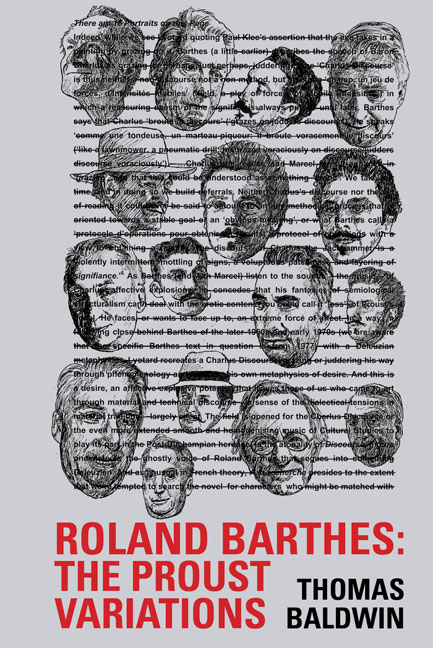3 - Music, Discourse
Summary
In a talk given in Rome on 20 May 1977, subsequently published in Italian in the Nuova rivista musicale italiana as ‘La musica, la voce, il linguaggio’ (1978), Barthes explains why it is not easy to talk and write about music: ‘Many writers have spoken well about painting; none, I believe, has spoken well about music, not even Proust. The reason is that it is very difficult to link language, which is of the order of the general, and music, which is of the order of difference’ (V, 523). All writing on music – Proust's included – is unsatisfactory, he contends, because it has failed to meet the demands of a typically Nietzschean approach to the work of interpretation, which requires a positing of values (an ‘évaluation’ (V, 523)). In other words, for Barthes, writing about music usually consists of indifferent commentaries that ignore the value of music ‘for me’ (‘pour moi’) in favour of a generalized ‘for everyone’ (‘pour tous’ (V, 523)). It is inhabited by a ‘futile discourse, [a] discourse of music-in-itself or of music for everyone’4 that ignores the constraint to evaluate and to affirm that music's force, its ‘différence’, places on its listeners (see V, 524). Like Proust's novel, the human voice – the focus of his essay is the operatic and concert baritone Charles Panzéra (1896–1976) – is viewed by Barthes as inexhaustible. It too, he says, is underdetermined by scientific discourse (commentary) upon it:
there is no science (physiology, history, aesthetics, psychoanalysis) that exhausts the voice: no matter how much you classify and comment on music historically, sociologically, aesthetically, technically, there will always be a remainder, a supplement, a lapse, something non-spoken that designates itself: the voice. (V, 524)
According to Barthes, in writing about the music of the human voice, we are obliged to affirm a value actively and, in so doing, to acknowledge that our relationship with that voice is necessarily erotic (‘forcément amoureux’ (V, 524)).6 Furthermore, as the title of his essay partially indicates (‘la langue’ is both language and the part of the human anatomy that makes – normal – speech possible (the tongue)), Barthes emphasizes the relationship between the voice and the body in Panzéra’s art. He goes on to assert that Panzéra's musical practice is the site of an uncommon phenomenon: the irruption of music within language.
- Type
- Chapter
- Information
- Roland Barthes: The Proust Variations , pp. 79 - 130Publisher: Liverpool University PressPrint publication year: 2019

